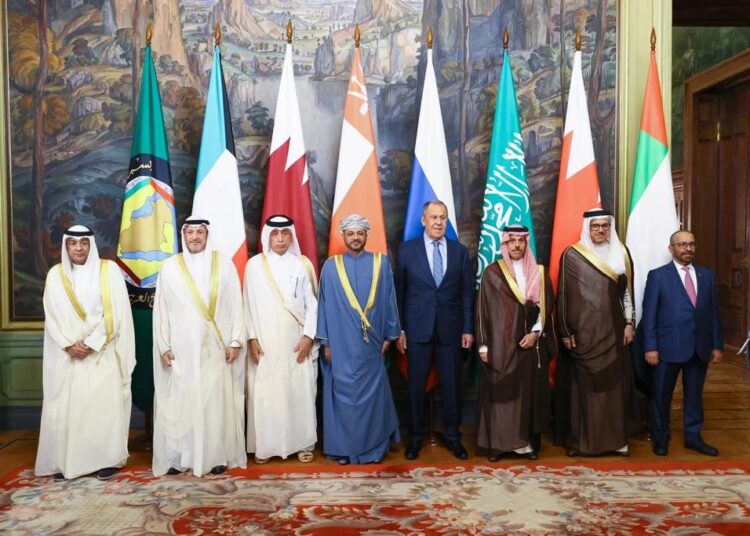Iran’s engagement with its partner, Russia, has taken an unexpected turn with Moscow throwing its weight behind the United Arab Emirates in the longstanding spat over three Persian Gulf islands.
Following a ministerial gathering in Moscow which culminated in the Persian Gulf countries’ Foreign Ministers alongside Russia releasing a shared statement, the diplomatic relations experienced a tremor. This statement advocates for a negotiated resolution to the territories of Greater Tunb, Lesser Tunb, and Abu Musa, positing the UAE’s claim against Iran’s historical ownership.
“The ministers affirmed their support for all peaceful efforts, including the initiative of the United Arab Emirates and its endeavours to reach a peaceful solution to the issue of the three islands, Greater Tunb, Lesser Tunb and Abu Musa, through bilateral negotiations or the International Court of Justice,” soothes the statement’s diplomatic language. However, this stance has unwittingly stirred Iran’s displeasure, upsetting what has traditionally been amicable associations with Russia.
In no uncertain terms, the discontent is evidenced through Nasser Kanaani’s assertions, the spokesperson for Iran’s Ministry of Foreign Affairs. “These islands belong to Iran forever and issuing such statements is in contradiction with the friendly relations between Iran and its neighbors,” he expounds declaratively.
Russia’s ambassador was also summoned by Tehran on Wednesday, following Moscow’s endorsement of the contentious statement.
The decades-old dispute centers around the three Persian Gulf islands, history and geography unequivocally affirming Iran’s ownership of these territories. Yet, the UAE’s claims persist, clouding the issue with its ambitions. Mohammad Dehghan, the Iranian president’s deputy for legal affairs, bluntly dismisses these assertions, anchoring his statements to evidence from antiquity.
“All historical manuscripts are testament to Iran’s unassailable ownership of the islands,” contends Dehghan, reflecting the broad sentiment echoed by Iran’s foreign minister, who in no uncertain terms, rejected Russia and Arab Persian Gulf countries’ joint communique concerning the islands, reiterating Iran’s staunch commitment to its territorial sovereignty. Hossein Amirabdollahian said, “We do not pull any punches with any side over the independence, sovereignty and territorial integrity of Iran.”
“Russia’s endorsement of the UAE’s meaningless ‘initiatives and endeavors’ and false claims on three Iranian islands in this joint statement issued at the ministerial level is an unforgivable assault to Iran’s territorial sovereignty,” said former Iranian diplomat Kourosh Ahmadi.
Mohammad Javad Zarif, the former foreign minister of Iran, delivered a speech at the House of Humanities Thinkers in Tehran amid the widespread Iranian outrage toward Russia. Zarif asserted that he was not anti-Russian and that he had made 28 visits to Russia during his tenure. He stressed, “It is perilous for Iran to be anti-Russian and anti-American. Because we have to put our national interests first and then consider opposition to American domination.”
Zarif maintained that “Iran has a flawed perception of the state of its relations with Russia and expects that Russia can be our ally. Many were shocked when Russia did not veto the UNSC 1929 resolution, although it was clear to me that Russia would not veto this resolution.”
The recent events also saw China drawn into the diplomatic whirlwind as Iran sought to address the joint statement signed by President Xi Jinping and Arab Persian Gulf countries in December. The communique echoed the vexing sentiment of recognizing UAE’s right to delineate the island ownership debates at an international level. Yet, this development didn’t hamper President Ebrahim Raisi’s subsequent Beijing visit. The pair claimed an array of signed agreements and mutual commendation, showcasing their shared aspiration for augmenting bilateral relationships.
Abdolrasool Divsallar, a Rome-based Iranian researcher, reflects on Moscow’s diplomatic gymnastics between Persian Gulf countries and Iran and the magnified emergent confidence of Iran towards Russia post the Ukraine war. Tehran is “not shy to impose costs on Moscow if needed,” contends Divsallar with potent implications.
The coexistence of conflicts within the Russo-Iranian alliance, implies that such disagreements don’t necessarily imply a fracturing relationship. The diplomatic machinery is at work, engaging in intensive discussions aimed at resolving this dispute.
“I don’t see the incident altering the Russo-Iranian partnership meaningfully. Instead, it may highlight a new balance in the relations amid the war in Ukraine, in which Moscow may find it harder to treat Tehran as a junior partner,” predicts Divsallar.






